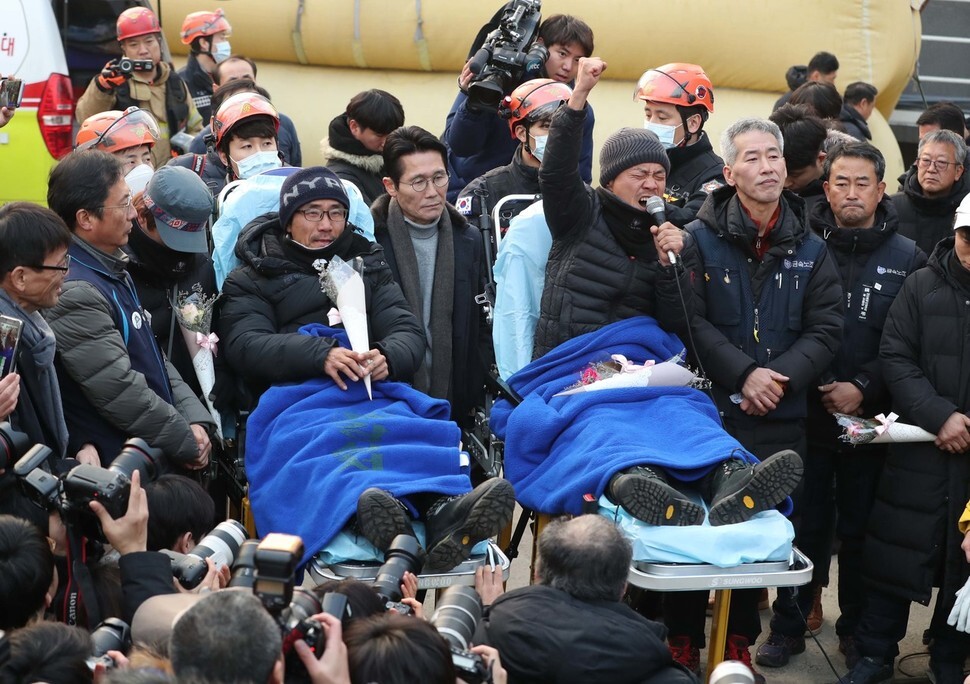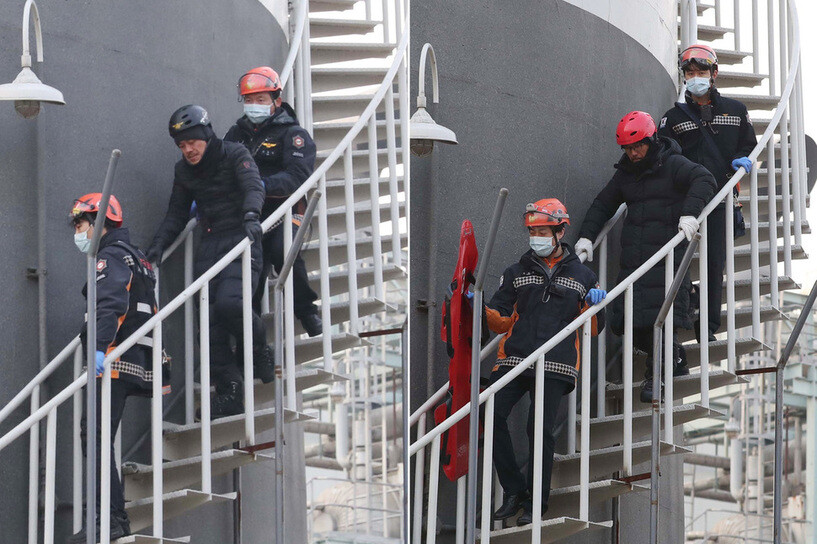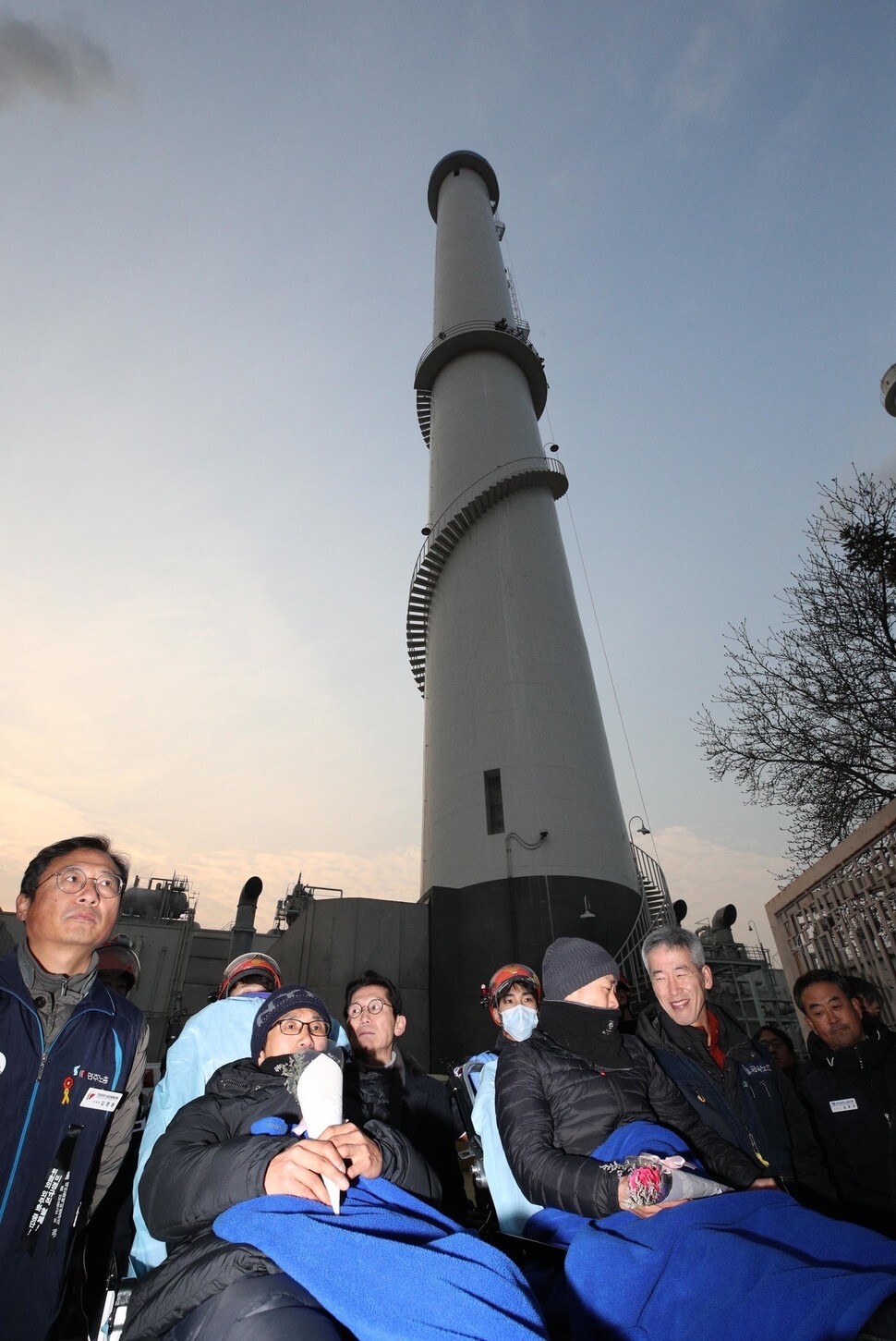hankyoreh
Links to other country sites 다른 나라 사이트 링크
Former FineTek workers end their smokestack sit-in after 426 days

“It’s a democratic labor union. Why is that so hard to defend? The world really sucks.” (Hong Gi-tak, former head of the union chapter)
“I wasn’t planning to be here, but thank you very much. I’d like to express my gratitude.” (Park Jun-ho, secretary general)
Two men had to spend 425 nights at an elevation of 75m in the air in order to get their hands on two pieces of paper that begin with the word “agreement” and end with the phrase “do our best.” Those nights were spent in a place they called the “prison in the sky,” a place unfit for the habitation of birds, let alone humans.
Hong Gi-tak, former leader of the FineTek chapter of the Korean Metal Workers’ Union, and Park Jun-ho, the chapter’s secretary general, used to work for Hankook Synthetics, which was acquired by Starflex in 2010. On Nov. 12, 2017, Hong and Park climbed up the smokestack at a cogeneration power plant operated by Seoul Energy Corporation in the Mok neighborhood of Seoul’s Yangcheon District to demand that Kim Se-kwon, president of Starflex, keep his promise to allow former employees for Hankook Synthetics to keep their jobs.

At 4:20 pm on Jan. 11, the two men stepped foot on the ground after 426 days in the air. They decided to return to earth after representatives from labor and management – including Cha Gwang-ho, head of the FineTek union chapter, and Kim Se-kwon – reached an agreement at 7:20 that morning guaranteeing that the workers would be employed at FineTek, a Starflex subsidiary.
But Park and Hong returning to earth wasn’t a simple matter. A team of firefighters laid down an air mat and attached safety ropes to the smokestack to prepare for any eventualities. These safety precautions took about an hour. At 3:30 pm, the two men, with ropes tied to their bodies, descended a vertical ladder, which took over 20 minutes. After they reached the round staircase that spirals down the smokestack, firefighters met them and helped them make their way to the bottom, which took another 30 minutes. Completely drained of energy, the two men walked slowly, their legs wobbling and their hands trembling as they gripped the railing of the circular staircase, in testament to the state of their health. They were on the sixth day of a hunger strike that had begun on Jan. 6.
More than 300 people were there to watch the two men make their way down the smokestack. The spectators cheered them on: “Hong Gi-tak and Park Jun-ho, hang in there! We’re here with you!” It took the two men a total of 50 minutes to completely escape their “prison in the sky.”
Once their feet touched solid ground, they were placed on stretchers. When they were carried out of the entrance to the Seoul Energy Corporation facility, their colleagues raised their voices in a strikers’ song. While the song was being sung, the two men didn’t say a word, holding tightly to the hands of Cha Gwang-ho and other colleagues.
Overcome by emotion, Hong kept squeezing his eyes shut and opening them again. Park gazed at the attendants and journalists looking at him with a blank expression, as if his return to the ground hadn’t quite sunk in yet. When the song was nearly open, the tears he’d been holding burst out at last. Seeing that, Hong, still sitting on the stretcher, mustered the energy to lift his right arm and shout, “We gave up our youth. The democratic union must be defended at all costs!”
“My initial feelings about their safe return are joy and gratitude. But thinking about how they came back to earth makes me so sad,” said Mun Yong-min, 49, one of the people who watched Hong and Park make their descent.
“I hope that the two workers’ safe return today will be an opportunity for our society to take the first step toward becoming a ‘world worth living in,’” said Park Seung-ryeol, head of the human right’s center for the National Council of Churches in Korea. Park had been part of a 25-day sympathy hunger strike that ended on Friday.
“It’s sad that so many people have to work so hard to secure one little right that’s guaranteed by the constitution,” said Park Rae-gun, the director of a human rights foundation called Saram, meaning “person.”

The heart of the dramatic deal reached by labor and management on Hong and Park’s 426th day on the smokestack is for Starflex President Kim Se-kwon to also become the president of FineTek, a Starflex subsidiary. This safeguard is designed to ensure that the terms of the agreement are carried out. In 2015, an agreement between labor and management had convinced Cha Gwang-ho to end a 408-day sit-in atop the smokestack, but the company didn’t carry out its side of the agreement. But since the new agreement contains the caveat “employment is guaranteed for at least three years,” the possibility remains that a debate about the sustainability of the workers’ employment could erupt three years from now.
By Seon Dam-eun, staff reporter
Please direct comments or questions to [english@hani.co.kr]

Editorial・opinion
![[Guest essay] The real reason Korea’s new right wants to dub Rhee a founding father [Guest essay] The real reason Korea’s new right wants to dub Rhee a founding father](https://flexible.img.hani.co.kr/flexible/normal/500/300/imgdb/original/2024/0423/8317138574257878.jpg) [Guest essay] The real reason Korea’s new right wants to dub Rhee a founding father
[Guest essay] The real reason Korea’s new right wants to dub Rhee a founding father![[Column] ‘Choson’: Is it time we start referring to N. Korea in its own terms? [Column] ‘Choson’: Is it time we start referring to N. Korea in its own terms?](https://flexible.img.hani.co.kr/flexible/normal/500/300/imgdb/original/2024/0423/3617138579390322.jpg) [Column] ‘Choson’: Is it time we start referring to N. Korea in its own terms?
[Column] ‘Choson’: Is it time we start referring to N. Korea in its own terms?- [Editorial] Japan’s rewriting of history with Korea has gone too far
- [Column] The president’s questionable capacity for dialogue
- [Column] Are chaebol firms just pizza pies for families to divvy up as they please?
- [Column] Has Korea, too, crossed the Rubicon on China?
- [Correspondent’s column] In Japan’s alliance with US, echoes of its past alliances with UK
- [Editorial] Does Yoon think the Korean public is wrong?
- [Editorial] As it bolsters its alliance with US, Japan must be accountable for past
- [Guest essay] Amending the Constitution is Yoon’s key to leaving office in public’s good graces
Most viewed articles
- 1Samsung barricades office as unionized workers strike for better conditions
- 2[Editorial] Japan’s rewriting of history with Korea has gone too far
- 3[Column] The president’s questionable capacity for dialogue
- 4[Reporter’s notebook] Did playing favorites with US, Japan fail to earn Yoon a G7 summit invite?
- 5[Column] The clock is ticking for Korea’s first lady
- 6Korean government’s compromise plan for medical reform swiftly rejected by doctors
- 7[Column] Are chaebol firms just pizza pies for families to divvy up as they please?
- 8Why Korea shouldn’t welcome Japan’s newly beefed up defense cooperation with US
- 9[Column] Has Korea, too, crossed the Rubicon on China?
- 10US overtakes China as Korea’s top export market, prompting trade sanction jitters